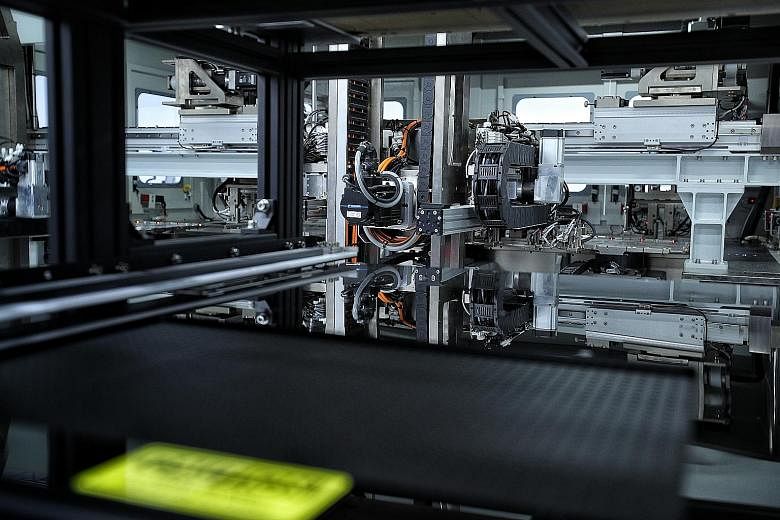As businesses transform themselves to adapt to the changing nature of work, their workers will need the right skills to take on new or redesigned job roles.
There is also room for training providers, institutes of higher learning and unions to play a "bigger and more sustained role" in upskilling and creating career progression pathways for workers, the Emerging Stronger Taskforce said in its report yesterday.
At the same time, Singapore must remain open to talent from abroad to boost its local workforce, the task force added.
National Development Minister Desmond Lee, who co-chairs the task force tasked to guide Singapore's economic recovery from the pandemic, said there is a need to help workers bridge skills gaps and prepare for an uncertain future.
"We will support Singaporeans in this journey and provide the assistance, as well as the resources that they need, to take on new and better jobs in a post-Covid-19 world," he added.
To ensure workers stay ahead of the curve, the task force urged businesses to work with intermediaries and unions to identify job disruption and training needs early, and chart upskilling plans.
In addition, industry leaders, or "queen bees", can chip in to help with the training needs of not just their own staff, but also those from other firms. Some entities such as SMRT and Kwong Wai Shiu Hospital are already leveraging their extensive commercial networks to support smaller firms.
The task force also called on the Government to grow a pool of large local enterprises that "cannot be easily displaced in global value chains". It suggested ways - such as innovation, internationalisation, mergers and acquisitions, and talent development - to help them scale up.
Singapore's corporate ecosystem also has to be made conducive for a broad base of firms to excel globally, including small and medium-sized enterprises, noted the report. It highlighted the Republic's industry transformation maps - blueprints for how 23 key industries should transform themselves for the future - as an example. This will, in turn, create good jobs for Singaporeans, strengthen the Singapore core and produce the next generation of successful enterprises, said the report.
The task force recommended the use of different tools to help promising high-growth enterprises create new products and access new markets, such as equity financing and encouraging technology and capability transfer.
Firms should then get opportunities to test their products before expanding to overseas markets.
-
Avoid narrow definition of 'Singapore core', says DPM Heng
-
The "Singapore core" should not be too narrowly defined in terms of whether someone is Singapore-born, a new citizen or a foreigner who is helming a company, Deputy Prime Minister Heng Swee Keat said yesterday.
"That test for us must be the commitment to Singapore, the commitment to the well-being of Singapore and of Singaporeans," he said.
He was responding to a question at a virtual media conference by the Emerging Stronger Taskforce, on which term - "Singapore core" or "Singaporean core" - most accurately captures Singapore's workforce policy, and what global talent will be needed to implement the task force's recommendations.
Drawing on his own experiences running the Monetary Authority of Singapore during the 2008 to 2009 global financial crisis, Mr Heng said many chief executives of international banks in Singapore had given him outstanding advice on how to deal with the crisis - demonstrating that they had Singapore's interests at heart.
"Some of the CEOs from these banks are as Singaporean as Singaporeans who were born in Singapore and went through national service... In fact, some of them, whom I knew personally, had become Singapore citizens," said the minister, without elaborating.
The task force was formed last May to chart Singapore's post-pandemic recovery, and yesterday released a report outlining economic strategies to drive the country's transformation.
Mr Heng noted that Singapore would have to contend with the twin challenges of an ageing labour force that is growing slowly, as well as a digital, networked economy where it is going to be much more of a winner-takes-all situation.
"Nobody is going to be happy with a second-rate programmer, so what you need to do is for us (to) assemble the best possible team," said Mr Heng, who is also Coordinating Minister for Economic Policies.
Businesses and workers in various sectors will be able to benefit in the process, he added.
As a multiracial, multicultural and multi-religious society, Singapore must not end up like some other countries and territories in the world, where the fear of losing jobs leads to a protectionist instinct where people as well as goods and services from other places are kept out, he cautioned.
He said jobs and skills transformation will also be a key part of the task force's work so that workers can benefit from these changes across various economic sectors.
"We want to equip Singaporeans to have that cultural sensitivity... to be able to go out to the region, to be leaders in building new connections. So, we must have that confidence and the drive to do so," he added.
At the same time, he stressed, the authorities will put a stop to bad employment practices.
"On the whole, I think we must get our strategic direction correct - that we welcome people from all over the world who can add value to us, (and) who share our views."
Yuen Sin
The task force stressed that Singapore must also remain open to skills from abroad as future opportunities require new capabilities it may not currently have.
"We will need to continue bringing in global talent to complement Singaporeans so that businesses have access to the skills they need to grow, with a view to ultimately helping Singaporeans build up and refresh their skills to move into better jobs," it said.
The task force pointed out that workforce challenges will be more pronounced as Singapore faces an ageing population and a low resident total fertility rate.
The workforce will require new skills in areas such as digitalisation and cyber security, it added.
"A highly skilled workforce with good-quality jobs is both the enabler and the goal of our economic transformation. Singapore will only be as competitive as the talent we have," said the report.
Task force members noted that even as Singapore transforms its workers into Worker 4.0 - a term for next-generation manpower equipped with new skills - employers must ensure the work environment embraces such changes.
Mr Amos Leong, president and chief executive of Univac Group, called for a "Manager 4.0" mindset, saying that workforce development begins at the top.
"We can keep sending workers for training but when they come back, we must have the processes and expanded job scope to fit them," he said.
Ms Jessie Yeo, executive secretary of the Singapore Port Workers Union and human resource director at the National Trades Union Congress, said this would ensure workers who have upgraded themselves can put their new skills to use, instead of returning to "the old ways of working".


